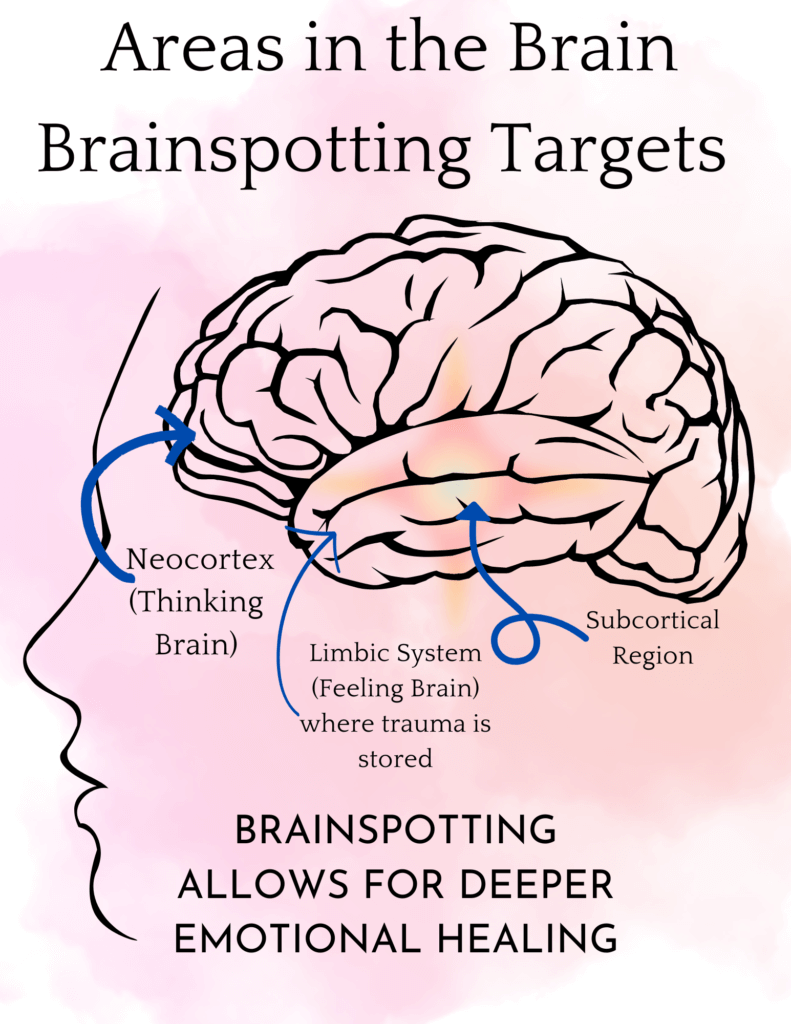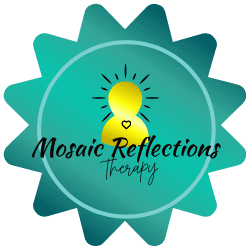Brainspotting Therapy vs EMDR: Which Is Best for You?
If you’ve been feeling stuck, overwhelmed, or like your trauma is taking up way too much space in your life, you’re not alone. Many women across North Carolina, from Charlotte, Asheville, Chapel Hill, Cary, or Davidson, are searching for real healing, not just coping. Two of the most effective trauma-focused therapies offered virtually today are Brainspotting and EMDR (Eye Movement Desensitization and Reprocessing). But how do you know which one is right for you?
As a therapist who works virtually with women in high-stress, high-performing roles (especially moms balancing way too much), I often get asked this question. Let’s break down both therapies, explore the differences, and help you figure out which one might best support your healing journey.

What Is EMDR?
EMDR is a structured therapy developed in the late 1980s that uses bilateral stimulation (usually eye movements, tapping, or sounds) to help your brain reprocess traumatic memories. The idea is that your brain gets “stuck” in trauma loops, and EMDR helps move the memory from emotional overwhelm to resolution.
You focus on a distressing memory while following a set of eye movements guided by your therapist. This activates both hemispheres of the brain, helping you reprocess the memory so it no longer feels activating or overwhelming.
Commonly treated with EMDR:
- PTSD and trauma
- Anxiety
- Phobias
- Grief
- Childhood abuse or neglect
What Is Brainspotting?
Brainspotting (BSP) is a newer therapeutic approach developed in the early 2000s. It was actually discovered during an EMDR session. The premise is that where you look affects how you feel, literally. A Brainspotting therapist helps you find an eye position that activates a stuck memory, emotion, or physical response, and you stay with that spot to allow deeper processing.
It’s less structured than EMDR and doesn’t require talking about the traumatic memory in detail. It also works beautifully in virtual therapy, which is ideal for busy women balancing work, family, and healing from the comfort of home.
Commonly treated with Brainspotting:
- Complex trauma– PTSD, Childhood abuse or neglect
- ADHD-related overwhelm
- Anxiety and burnout
- Chronic pain
- Grief
- Phobias
- Emotional dysregulation

Key Differences Between EMDR and Brainspotting
1. Structure vs. Flow
EMDR is highly structured. It has eight clearly defined phases, including detailed memory recall and bilateral stimulation. Brainspotting is more intuitive and open-ended. You’re guided to “stay with” what you feel in your body, often without needing to relive the full memory.
2. Talking vs. Felt Sense
In EMDR, you talk through your memory while processing. In Brainspotting, you may say very little. It’s more about body awareness and deep, somatic release.
3. Conscious vs. Subcortical Processing
Brainspotting targets the midbrain, which is the deeper, survival-based part of your brain where trauma is stored. EMDR also taps into this, but Brainspotting is believed to reach deeper areas, especially those less verbal or accessible by traditional therapy.
4. Ideal for Virtual Therapy
While EMDR can be done virtually, Brainspotting is uniquely suited for virtual therapy. It doesn’t require physical tools, just the presence of your therapist and your ability to focus on a visual point.
Which Therapy Is Better for You?
Here are a few scenarios that might help you decide:
Choose EMDR if:
- You want a highly structured approach
- You’re ready to revisit specific traumatic memories
- You like guided steps and measurable progress
- You feel comfortable talking about your past

Choose Brainspotting if:
- You don’t want to talk through your trauma
- You’re dealing with chronic anxiety, overwhelm, or emotional shutdown
- You want to heal deeper, non-verbal trauma
- You have ADHD and want a more body-based experience
- You prefer a calming, intuitive session structure
- You’ve tried EMDR and had little success or haven’t had lasting success.
Why Brainspotting May Be the Better Choice for Deeper, Personalized Healing

While both EMDR and Brainspotting are powerful tools for trauma healing, many clients find Brainspotting to be a more intuitive and personalized experience. Because it gently accesses the midbrain. This is where trauma is deeply stored. Brainspotting allows for deeper processing without the need to retell painful stories or follow structured protocols. This flexibility often feels safer, especially for overwhelmed moms juggling mental load, past trauma, and emotional fatigue. If you’re seeking a healing method that meets you exactly where you are (emotionally and neurologically), Brainspotting may be the more compassionate and effective choice.
Brainspotting Done Virtually

Whether you’re in Charlotte, Chapel Hill, Asheville, Cary, Davidson, Matthews, Wilmington, or Weddington/Waxhaw, therapy is accessible. You don’t have to sit in traffic, take hours off work, or feel nervous in a waiting room. You can access powerfully healing trauma therapy in your own home, where you can feel most comfortable.
Brainspotting, in particular, is incredibly effective over telehealth. All you need is a quiet space, a stable internet connection, and your willingness to go inward.
Real Talk: What Clients Say About Brainspotting
Women often say Brainspotting feels like the first time therapy actually “worked.” They don’t have to explain everything. They feel the shifts in their body. Some cry, some feel heat or tingling, others notice a weight lifted.
Many moms I work with describe Brainspotting as a reset button for their nervous system. After years of anxiety, burnout, and feeling like they’re failing at everything, they start to feel more regulated, more themselves.
And you deserve that, too.
Ready to Try Brainspotting?
The good news? You don’t have to choose right now. Let’s talk about what you’re dealing with, what your goals are, and we can figure out the best approach together.
I offer virtual brainspotting therapy for women across North Carolina and South Carolina. Whether you’re juggling work and motherhood in South Charlotte, stuck in survival mode in Cary, or longing for calm in Chapel Hill, you’re not alone.

Healing Is Possible with Brainspotting
Both Brainspotting and EMDR are powerful trauma therapies. There is no one-size-fits-all answer, but with the right therapist and approach, healing is absolutely possible.
Let’s take that first step together.
Book a free consultation to learn which approach may be right for you.

Eleena Hardzinski is a Licensed Marriage and Family Therapist and a Certified Brainspotting Therapist who practices online in North Carolina, South Carolina, and Wisconsin.
Eleena supports women struggling with motherhood, relationships, past traumas, ADHD, anxiety, and more. She helps overwhelmed moms find balance, overcome guilt, establish healthy boundaries, heal from past traumas, improve family communication, and regain confidence and joy in their lives.
Keywords included: brainspotting therapy, EMDR vs brainspotting, virtual trauma therapy, brainspotting Charlotte, trauma therapy North Carolina, therapy for women with ADHD, online EMDR, brainspotting for anxiety, healing trauma virtually
Locations included: Charlotte NC | Chapel Hill NC | Cary NC | Davidson NC | Waxhaw NC | Weddington NC







